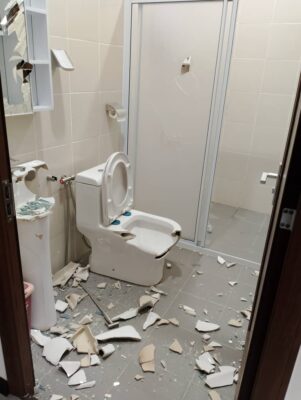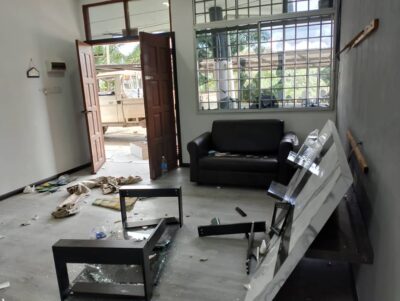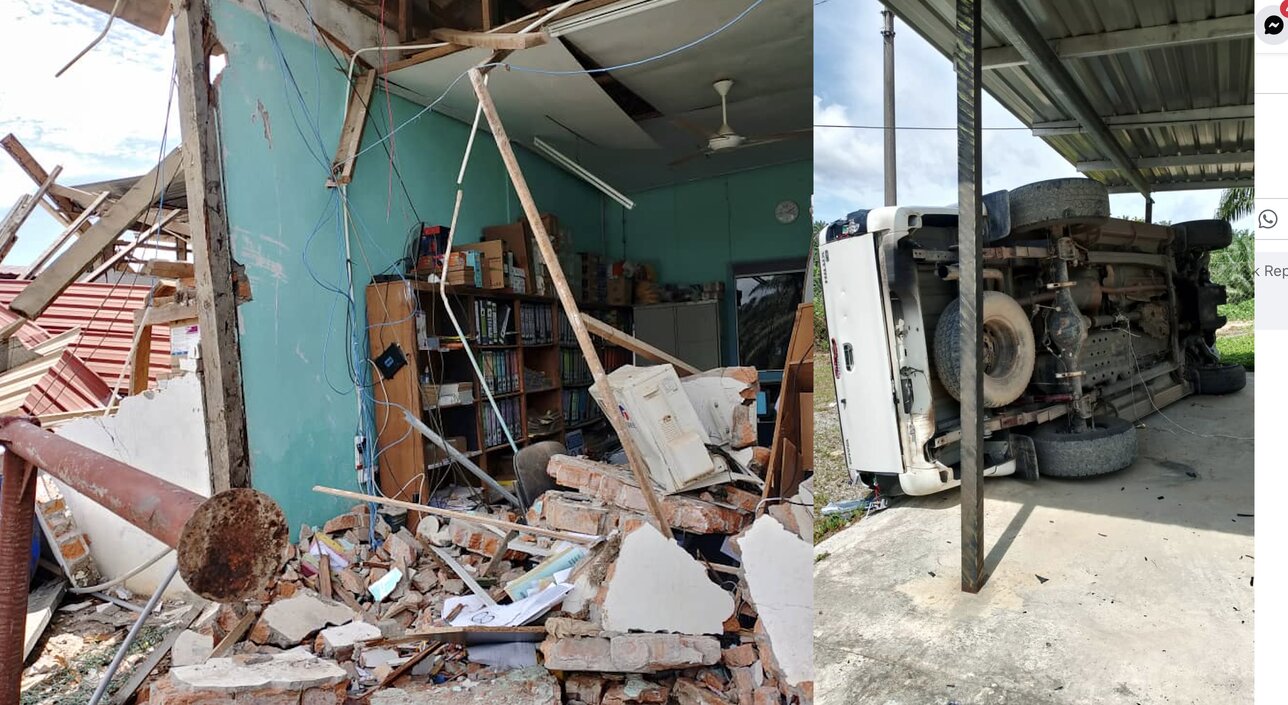This week yet another story of rural conflict was brought to the attention of Radio Free Sarawak. It is the sort of incident one rarely hears much reported in the pages of ‘mainstream’ media owned by local timber barons.
On the surface, the events comprised hooligan behaviour by some 200 local farmers in Suai Niah, who suddenly turned into rioters last Sunday afternoon.

The details, obtained by RFS from various anonymous reports from the ground, remain somewhat unclear.
However, the WTK plantation estate that was affected has released several pictures to back its version of events, showing apparently unjustified destruction of their headquarters buildings and the local police have carried out a number of arrests.
The angry mob turned on the estate and set about damaging infrastructure and machinery. In one dramatic incident the rioters apparently hijacked one of WTK’s own bulldozers to wreak destruction on offices and buildings.
Nobody was reported injured, it appears to have been more an outpouring of vengeance against a company that is plainly viewed by these local people not as bringing development and prosperity (the grounds for giving WTK and other key crony companies hundreds of thousands of hectares of timber and plantation licences in native areas) but as an oppressor in their lands.
So, what prompted the action from agricultural folk who normally spend their days working hard on their own little plantation areas alongside the massive estates?
The anonymous native callers told RFS that trouble has been brewing for some time. The estate has hired a contingent of ‘thugs’, locals say, to perform the role of security on their estates which (as usual) apparently prefer to employ cheap immigrant workers rather than local people.
The duty of the security guards is to prevent perceived thefts of fruit by local farmers of the WTK oil palm fruits, say the informants.
They have carried out the task by intimidating and threatening local farmers trying to cross the WTK plantations to get to their own plots to farm and harvest the areas of their native lands that have been left to them, between the vast concessions handed out by the state government to the crony company.
By banning use of their roads the company has therefore denied access to the farmers to their own orchards and moreover employed violence and threats in the process.
Later reports have provided further insight with allegations that promises had been made at the outset of the plantation that 30% of the profits would come to the villages. Ten years later the locals are still waiting and patience had run out.
Does the outburst of anger and destruction suddenly become more understandable?
Might the attitude of anyone who may have been taking more than their allocated share of fruit (if such thefts are proven to be genuine) likewise become more understandable, given the history of favouritism towards outside businesses towards the local people of the area?

Nonetheless, true to form, the local police made clear in an announcement today that they are seeking to arrest offenders and ‘mete out justice’.
That is standard procedure, however it ignores the corruption and unfairness of the situation facing the indigenous people of Sarawak which likely played its part in provoking this outburst of spontaneous anger.
Needless to say, as usual, the local representatives have been nowhere to be seen and have done nothing about the situation that built up to this event.
Save, that in the past, one Adun for the area, Kemana YB Steven Rundi, did fully acknowledge the problems facing his Dayak constituents, who have been deliberately by-passed and left impoverished by Sarawak’s so-called development.
In a statement to the Borneo Post, Rundi admitted with respect to his Iban constituents in Niah that “The government is aware of their plights and their sufferings”. At the same time he assured the KTS owned paper that the state government had “concrete plans” to bring more development to them.
That was back in 2010!
Sarawak Report back at that time pointed out that Rundi’s PBB controlled state government had failed to bring more development for more than 30 years already. Now it is 50 years and although Rundi is still in office, along with his fellow elite PBB crony politicians, the party has done nothing further to improve the lives of the people he is allegedly elected to represent.
We are yet to hear the “concrete plans”.
So, is it so very surprising that the dirt poor people who receive so little from Sarawak’s huge investment budget in these rural areas are starting to tear down concrete to make their point?

